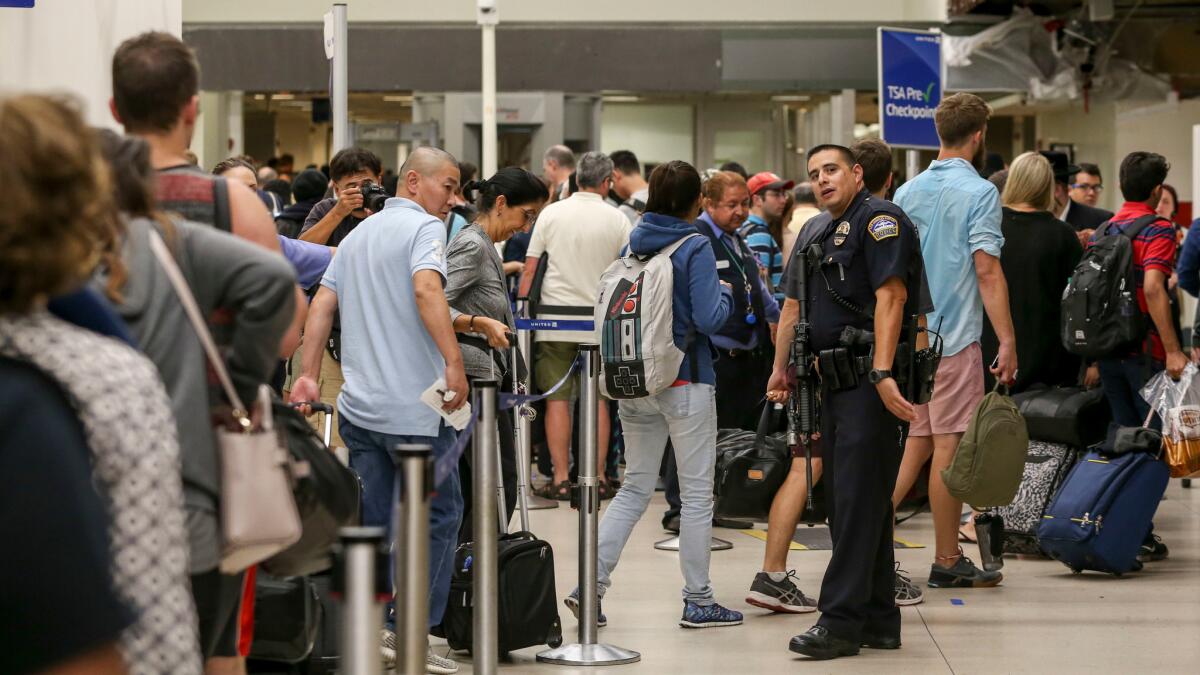Editorial: Police pension Measure SSS raises too much doubt to support

- Share via
On its face, Measure SSS — which will be on the Nov. 8 ballot just for voters in the city of Los Angeles — seems straightforward.
It would move new hires at the L.A. Airport Police Department into the same pension plan as other police and fire department employees in the city, Los Angeles Fire and Police Pensions. It also would allow the some 500 current airport officers to buy their way into the LAFPP. Unlike more than 13,000 other public safety employees, airport police officers are covered by the general pension system for municipal workers, Los Angeles City Employees’ Retirement System, or LACERS.
If this measure passes, eventually all the police officers in the city’s three separate police departments — LAPD, the L.A. Port Police and the airport officers — would be members of the same pension fund, receiving comparable retirement benefits (they are already paid on the same salary scale). That’s a goal of city officials because it would make it easier to shift public safety personnel around as needed without running into the obstacle of incompatible retirement benefits.
But scratch the surface of this measure, which requires a change of the city’s charter, and the picture becomes murkier — and the argument for SSS less compelling.
First, it would add to the city’s already heavy pension burden, which consumes about 20% of the city’s general fund. Though the increase in pension costs may be relatively small, it’s a move in the wrong direction. It would also raise police pension costs for the Los Angeles World Airports by 15% to 19%. That’s because the cops and firefighters in LAFPP have enjoyed more generous retirement packages than other municipal employees, allowing them to retire earlier with a higher monthly stipend to reflect the inherent danger and physical demands of their jobs. For example, members of LACERS have to wait until they turn 55 or 60 (depending on the tier they are in) to retire with full benefits, but members of LAFPP can retire at 50. Fire and police pensioners who retire early also get bigger pension checks than early retirees in LACERS.
Second, the union representing airport police officers isn’t supporting this measure, even though it negotiated the terms of Measure SSS with the city. Though the change would benefit future recruits, it probably wouldn’t be attractive to most current airport police officers. City officials estimate those officers may have to pay as much as $20,000 for each year they’ve served to buy into the LAFPP. Meanwhile, the Los Angeles Police Protective League, which represents LAPD officers, is opposing the measure because the union says it was left out of the process and doesn’t believe the city has adequately addressed the potential negative impacts of this change on the fire and police pension fund, on current members and on taxpayers.
Finally, in supporting Measure SSS, voters may be unwittingly committing the city to a future merger of the airport police and LAPD without a proper public discussion about whether it would be the right decision for the airport or the city. From an administrative standpoint, there may be good reasons to combine all the uniformed police in the city under a single command, rather than having the airport police reporting to Los Angeles World Airports and the harbor police to the Port of Los Angeles. (It would certainly make it easier to move officers to where they are most needed, and to take a unified, citywide approach to terrorism.) But the consequences need to be explored fully before the city heads down that road.
Measure SSS is an incremental move in that direction, which seems premature. That, combined with the cost and the lack of support from the affected officers, is reason enough to vote no.
Follow the Opinion section on Twitter @latimesopinion and Facebook
More to Read
A cure for the common opinion
Get thought-provoking perspectives with our weekly newsletter.
You may occasionally receive promotional content from the Los Angeles Times.










